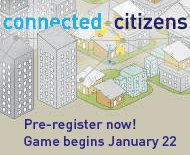Future Now
The IFTF Blog
Connected Citizens: Filling the Cracks in a Shrinking Public Sector
The wave of fiscal austerity that has swept across Europe and the United States in the last several years has created a challenging environment for local leaders - tax revenues are shrinking, national stimulus funds are a distant memory, layoffs have decimated the ranks of public employees, and a new generation of citizen-consumers weaned on the cloud and smart phones expect ever-accelerating levels of service and innovation.
 In the United States, local governments have laid off some 500,000 workers since 2009. In Greece, where cities have already made deep and painful cuts in their workforces, Der Spiegel reports that mayors and local labor unions are now openly defying central government orders for further layoffs stemming from the most recent round of austerity measures.
In the United States, local governments have laid off some 500,000 workers since 2009. In Greece, where cities have already made deep and painful cuts in their workforces, Der Spiegel reports that mayors and local labor unions are now openly defying central government orders for further layoffs stemming from the most recent round of austerity measures.
While this trend is limited, for now, to the more developed economies of the Global North, as the world economy struggles to mount a recovery from its post-recesson stagnation (the World Bank's 2014 growth forecast doesn't anticipate any of the major economies coming close to their 2010 peak post-recession growth figures)... are China, India, Brazil, Turkey and others close behind?
Increasingly, the question on every civic leader's mind is the same:
How can we mobilize citizens to fill the cracks in a rapidly shrinking public sector?
A host of new web-based tools for collaboration are allowing people to connect in new ways - Change By Us, In Our Backyard, Kickstarter - the list grows every day. What problems are yielding to these kinds of approaches? What could they be used for in the future?
Yet as we rush into the future of connected citizenship, what are we leaving behind?
What are the risks of delegating vital public services to self-organized groups? Will some communities be left behind?
So what if together we could imagine hundreds of civic innovations to plug the gaps government services?
The Institute for the Future's upcoming Foresight Engine experiment, Connected Citizens, is a one-of-a-kind, 24-hour collaborative forecasting game produced by the Institute for the Future’s Governance Futures Lab. Gameplay begins January 22 at 12pm PST and ends January 23 at 12pm PST. Using IFTF’s Foresight Engine, you’ll exchange ideas with hundreds of social inventors and creative thinkers from around the world about the technologies, dynamics, and dilemmas generated in this new world of connected citizenship.



